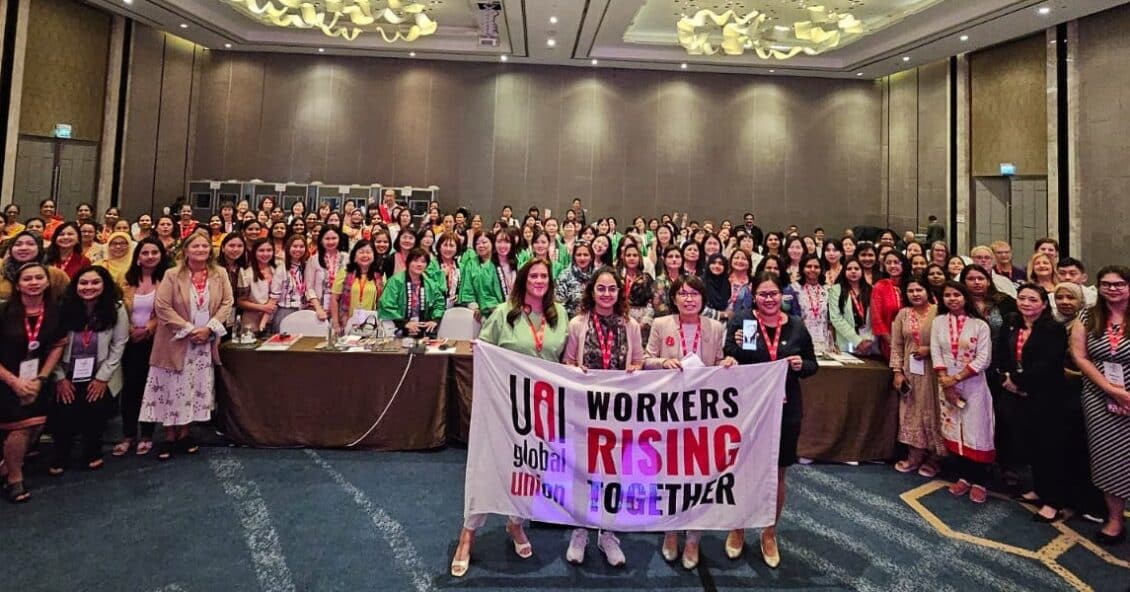UNI Asia & Pacific: Women demand transformational change
20.11.24
The second day of the UNI Asia & Pacific Women’s Conference featured a dynamic agenda, as participants elected new leadership and charted an ambitious path forward for transformational change. Key priorities included advancing gender equality by ensuring safe workplaces, adopting gender-sensitive approaches to occupational health and safety, and intensifying efforts to encourage young women to take on leadership roles in trade unions.
Opening the conference, Alke Boesigger, Deputy General Secretary of UNI Global Union highlighted the progress to advance the position of women since the last women’s conference in the region five years ago.
“UNI’s 40 for 40 campaign, the consistent application of the 40 per cent rule and of course the mentoring programme were instrumental in achieving a significant rise in women’s participation at UNI conferences and in UNI decision making structures,” said Boessiger. “In Philadelphia last year for the first time ever we had more women delegates than men at a UNI congress! It was a proud moment.”
Transforming for Gender Equality and Safe Working Environment
Concerted action by trade unions led to a new International Labour Organization Convention 190 to eliminate violence and harassment in the world of work in 2019. However, much remains to be done in the region and to convince more governments to adopt the convention and make the protection of women a priority.
Ruksana Perven from GPEU, Bangladesh introduced the conference motion on Transforming for Gender Equality and Safe Working Environment. She said violence against women and girls remains one of the most pervasive human rights violations, significantly hindering the fulfillment of women’s rights and the achievement of the 2030 Sustainable Development Goals.
“Economic independence can be a pathway to escape violence, yet many victims face job disruptions and insecurity, leading to lower productivity and financial instability. To address these challenges, UNI Asia & Pacific is committed to supporting the implementation of ILO Convention 190, promoting active participation in anti-violence campaigns, and advocating for the ratification of key conventions.”
During the discussion on the motion, Sulakkana Rajapaksha from the Federation of Bank Officers’ of Sri Lanka, pointedly said:
“When a person is harassed or abused in a workplace, It takes a lot for that person to understand that they are being abused…As unions it is our duty to educate them, acknowledge them and make them aware that it is a skill to say NO when necessary.”
Kim Tae Hee from the Korea Finance Industry Union, explained additional factors contributing to a lack of safety at work, such as stress and workload, are negatively impacting women and society. The birth rate in Korea has plummeted to 0.72 per person, the lowest among 38 OECD countries.
“In an environment where you cannot devote enough time and emotion to your children due to long hour working, the burden of childbirth and child-rearing will inevitably increase,” she explained, adding that her union is pushing for a four-day week and a reduction in working hours to allow parents more family time and work/life balance.
Women transforming unions
Women’s role in shaping unions was a key focus for the conference. Shanika Silva, from CBEU, Sri Lanka said:
“Transformation is important, because women bring unique perspectives to union issues. We understand that gender inequality in the workplace goes beyond pay disparities. It includes lack of access to leadership roles, unfair treatment in promotions, and difficulties in balancing work and family life. Women’s voices in unions ensure these issues are addressed head-on. When we speak up, we amplify concerns that impact not only women but also families and communities.”
She highlighted the South Asian Professional Women’s Network as a key initiative to boost regional collaboration and empowerment. UNI’s mentorship programmes, she emphasized, have been instrumental in equipping women with leadership skills.
“Women are not just participants, we are catalysts for change in unions. By embracing their roles and addressing gender-specific issues, unions can become more inclusive, responsive, and effective,” said Jackelina Binti Lajium, UPCW, Malaysia.
Michiko Abe of UA ZENSEN, Japan, told of her union’s efforts to increase women’s representation in the commerce sector at the union, which once stood at only 16 per cent. A campaign including conferences and quotas to increase the number of women in decision-making positions has proven successful.
Gender-Responsive Occupational Safety and Health (OSH)
UNI Equal Opportunities continues to advocate for occupational health and safety to be viewed through a gender-sensitive lens, releasing three new publications aimed at equipping trade unions to better support women throughout their working lives, during menstruation, maternity and menopause.
Dr. Kalyani Shete, an organizer for India’s Rashtriya Majdoor Sangh (RMS) union, highlighted the severe workplace health and safety challenges faced by women in South Asia.
“Access to sanitation facilities is a basic human right, and many of our women workers lack access to them, causing them to suffer from various health issues such as UTIs (urinary tract infections), PID (pelvic inflammatory disease), renal stones, lower abdominal pain and female genital organ-related issues,” she said, calling for trade unions to take action to address these conditions.
Helen Cooney from SDA in Australia emphasized the power of research-driven advocacy in driving changes in the law. She shared how unions have successfully integrated gender equality into Australia’s Fair Work Act, demonstrating how research based, union-led initiatives could transform occupational health and safety policies to be more inclusive.
Transforming for young women
“Today, we gather to recognize the crucial role that youth play as agents of change in our society. With around 60 per cent of the world’s youth concentrated in Asia Pacific, we have an unprecedented opportunity to shape a future where decent and sustainable work is prioritized, and the voices of young women are heard and valued,” said Bernadette Reyes, of NUBE-IFO, Philippines, kicking off the discussion on the final motion, Transforming for Young Women.
“As trade unions, we have a duty. A duty to fight against wage gaps, to eliminate gender-based violence, and to create opportunities for women to grow and thrive. A duty to offer mentorship, training, and leadership pathways that ensure young women’s voices are heard and valued. And just as importantly, a duty to create safe spaces within our unions – spaces where young women can organize, lead, and thrive without fear,” said UNI Head of Youth, Marta Ochoa.
The power of mentorship was a recurring theme. Launched three years ago across nine countries and 28 unions in the region, the UNI Equal Opportunities Mentoring Program has led to 43 per cent of mentees advancing into leadership positions.
UNI’s Head of Equal Opportunities, Veronica Fernandez Mendez reflected on the programme’s impact:
“The results are evident not just in the figures but in the lives touched, the careers advanced, and the confidence instilled in each participant. Mentees now stand taller, equipped with insights and skills. Mentors, too, have grown, finding renewed purpose in their guidance. Together, we have proven that when individuals are empowered, unions thrive.”
As the conference concluded, Ayako Nakata from UA ZENSEN, Japan, was voted UNI Asia & Pacific Women’s President, while Bhavneet Kaur Alang from AIBOBOA, India, was elected Deputy President.
As the day ended, participants from arguably UNI’s most diverse region, stand ready to transform the ideas, strategies and aspirations from the conference into reality back home.


